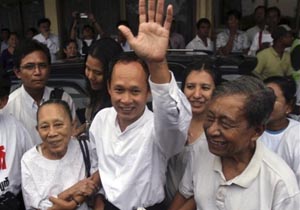The Last Night in the Cell
It was Jan. 12, the night before they were freed.
Pyone Cho, a leading member of the 88 Generation Students group detained in the remote Kawthaung Prison in southern Burma's Tenasserim Division, was immersed in a weekly journal when a prison guard he hadn't noticed standing in front of his cell asked him what he was reading.
Then the guard, speaking to him through the iron bars of Cell No. 6, told him the news: “You will be freed tomorrow.”
Pyone Cho wasn’t convinced. Coincidentally, the 46-year-old former student leader was reading about the “clemency” ordered by President Thein Sein on Jan. 3, just nine days earlier, which saw the release of around 30 political prisoners among more than 6,000 criminal convicts.
 |
| Pyone Cho, center, a leading activist of the 88 Generation Students Group, waves at his colleagues welcoming his arrival at Yangon airport after released from Kawthaung Prison in Tenasserim Division on Jan. 13. 2012. (PHOTO: Associated Press) |
But when the guard added that the prison had already booked his flight back to Rangoon, he started to doubt his assumption. Before he could say anything in reply, however, the guard disappeared without another word.
Suddenly alone with his thoughts, he began to wonder if the new amnesty, if it was for real, would apply to other members of the 88 Generation Students group. Almost all of them were serving sentences similar to his own for their role in protests against a dramatic rise in fuel prices in July 2007 that months later sparked the Buddhist monk-led Saffron Revolution, Burma's biggest mass uprising in decades.
As a veteran of Burma's pro-democracy movement, his first thought was how he and his colleagues could continue the struggle they began in 1988, when nationwide demonstrations toppled a military-backed socialist regime, only to be crushed by a new and even more brutal junta. He had already spent 15 years behind bars for his leading role in those protests; combined with the years he had served since his second jail term began in 2007, he had spent nearly half his life in prison for his political activities.
Still finding it difficult to believe that he would be released again so soon, but with his mind already racing ahead with ideas about how he and his fellow activists could accelerate the reforms begun by Thein Sein so that Burma could finally catch up with the rest of the region, he found it impossible to sleep. One issue that loomed large in his mind that night was Burma's ethnic conflicts, which he saw as the most important problem facing the country.
Over the past four years, Pyone Cho had spent much of his time reading. He read Nelson Mandela's “Long Walk to Freedom,” biographies of US President Barack Obama and former Chinese President Jiang Zemin, and novels. But the reading material he dedicated most of his time to was Burma's 2008 Constitution, drafted by a committee dominated by delegates handpicked by the former junta.
Another pastime was painting, an activity normally prohibited in Burma's prisons, but which he had somehow managed to convince the prison authorities to allow him to do. In four years, he finished around 20 paintings—mostly imagined landscapes, but also a few depicting the prison and his cell.
His mind still very active after so many years in prison, Pyone Cho spent his final night in prison thinking about the future. At the same time, he thought of his brother, Thet Win Aung, who he knew would never see freedom again. Also a political activist, Thet Win Aung died in 2006 while serving a lengthy sentence.
With such thoughts crowding into his mind, he resigned himself to a sleepless night and the uncertainty of the day that lie ahead.
***
That same night, but hundreds of miles away in another remote corner of Burma, Ant Bwe Kyaw sat in his cell in Katha Prison in Sagaing Division. Political colleagues since 1988, he and Pyone Cho were arrested together in 2007. Both men were 46 years old, and both had spent much of their lives behind bars.
Ant Bwe Kyaw's cell was one of just three in his cell block. His neighbors were a former lieutenant-colonel in Burma's infamous military intelligence service and an IT guy imprisoned for helping an activist group.
1 | 2 | 3 next page »
|
||
|
||
- Students Without a University
- Displaced and Distressed
- Training the Next Generation of Kachin Rebels
- Rangoon Art Show Provides Arresting Display
- Magical Mandalay Still Holds Court for Tourists
- Distrust and Displacement on Kachin Frontline
- Thein Sein: Reformist or Caretaker?
- School’s Not Out in Kachin State
- Irrawaddy Dolphins are Firm Fisherman’s Friends
- Thein Sein: Reformist or Caretaker?
